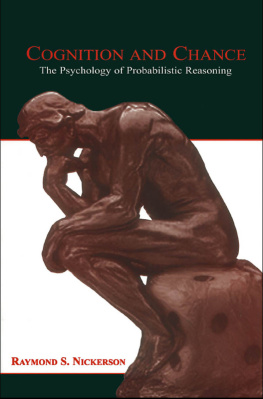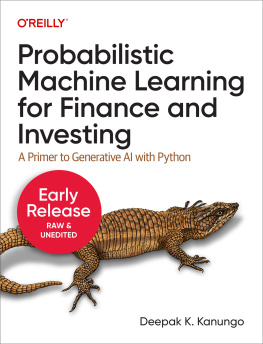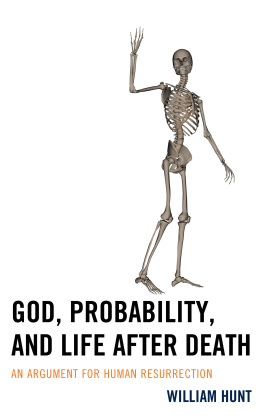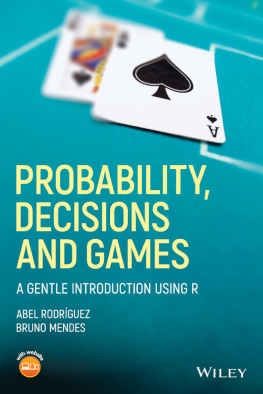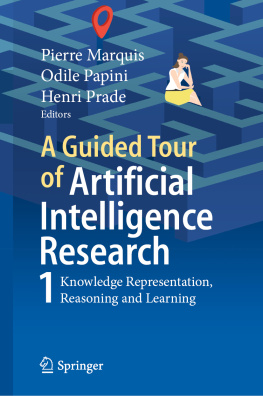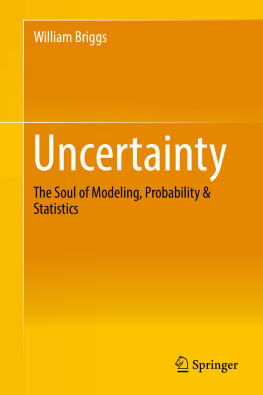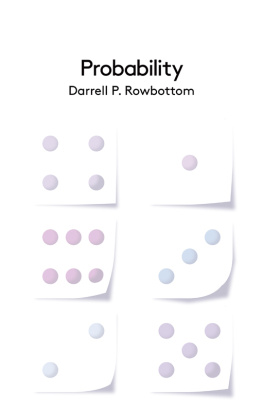Copyright 2004 by Lawrence Erlbaum Associates, Inc.
All rights reserved. No part of this book may be reproduced in any form, by photostat, microform, retrieval system, or any other means, without prior written permission of the publisher.
Lawrence Erlbaum Associates, Inc., Publishers
10 Industrial Avenue
Mahwah, New Jersey 07430
This edition published in the Taylor & Francis e-Library, 2008.
To purchase your own copy of this or any of Taylor & Francis or Routledge's collection of thousands of eBooks please go to www.ebookstore.tandf.co.uk.
To the fond memory of Carlton Gregory and A.Douglas Glanville exceptional teachers who honored their students by making them think
Preface
Everybody thinks probabilistically, whether knowingly or not. We judge the likelihood that the barking dog will bite, that the rumor that the company is about to have a big layoff is true, that bottled water is purer than what one gets from one's kitchen faucet The ability to think probabilistically is important for many reasons. Lack of it makes one prone to a variety of irrational fears and vulnerable to scams designed to exploit probabilistic naivet, precludes intelligent assessment of risks, ensures the operation of several common biases, impairs decision making under uncertainty, facilitates the misinterpretation of statistical information, precludes critical evaluation of likelihood claims, and generally undercuts rational thinking in numerous ways.
Often we lack the kind of evidence on complex issues that would permit us to draw a conclusion that we can be certain is correct. Frequently we have to make decisions on the basis of incomplete information and we cannot be sure of their consequences. But the need to settle for incomplete and uncertain information does not mean that our reasoning and decision making must be reduced to pure guesswork. Usually information of a statistical or probabilistic sort is available, or at least there is a basis for making some assumptions about the statistical or probabilistic characteristics of a situation of interest. One who can use this type of information effectively should do better, on the average, than one who cannot.
How good are individuals at thinking probabilistically? How consistent is people's reasoning under uncertainty with the principles of probability theory and mathematical statistics? These questions have been of considerable interest to researchers and the literature on this topic is very large. The evidence that has been produced is mixed. On the one hand are numerous indications that certain basic principles are poorly understood and that reasoning that should make use of those principles often is faulty. On the other hand are some experi-mental results that support the view that in many circumstances people's intuitions about statistics or probabilistic events are quite good.
My own interest in probabilistic reasoning derives in part from the belief that we all engage in it, more or less constantly, that we sometimes reason probabilistically in ways that suit our purposes very well and that we sometimes do rather poorly in this regard, and, finally, that a better understanding of probability and our abilities and limitations as probabilistic thinkers might help improve our thinking generally. But even if one could not legitimately claim that there are compelling practical reasons for studying probability and probabilistic thinking, I suspect that the allure of the topic, for me at least, would remain. I find probability, chance, randomness, and closely related concepts fascinating. I do not pretend to know what these terms mean in any deep sense; in fact the more I have thought about them, the more elusive whatever their referents are have become. I know that I am not alone in this respect and, indeed, believe that I am in rather good company.
My motivation for writing this book, as nearly as I can tell, was to learn something about probabilistic reasoningabout its origins, its status, its use in various contexts, what recent research has revealed about it, and so on. One should write a book, I have been told, with a specific audience in mind. This is undoubtedly good advice, but I confess to not following it. What I have written has been determined primarily by what I have found interesting. The book is divided roughly into two parts. The emphasis in the first part, which includes the first seven chapters, is historical and conceptual. The later chapters focus more on what research has shown about people's abilities and limitations as probabilistic thinkers.
gives an account of the birth of statistics and its increasing applications in science.
.
I can only hope that some readers will learn as much from reading the book as I think I did from writing it, and with as much pleasure. As to who such readers might be, I hope they might include psychologists, philosophers, and economists for whom probabilistic reasoning is an essential aspect of their efforts to understand the workings of the human mind more generally, researchers studying probabilistic reasoning, and students preparing to do so. I believe the book could be used as a major text for a graduate or upper-class seminar on probabilistic reasoning, or as a supplementary text for graduate or upper-class courses in cognitive psychology, philosophy, economics, or any subject for which probabilistic reasoning is a key topic. I have tried to write also, however, for the general reader who has an interest in the subject and little or no technical training beyond standard high school math. Familiarity with basic algebra should suffice for the great majority, if not all, uses of mathematics, of which there are relatively few.
I owe thanks to Jonathan Baron, Susan Butler, Richard Chechile, Julie Downs, Ruma and Rafael Falk, R.Duncan Luce, Nathan Nickerson, Richard Shiffrin, Salvatore Soraci, Howard Wainer, and Michael Wenger for helpful comments on parts of the manuscript and/or stimulating conversations on one or another aspect of probabilistic reasoning, to my granddaughter Amara Nickerson for helping to organize and check references, and, as always, to my wife Doris for her constant love, companionship, and encouragement.
CHAPTER 1: Probability and Chance
Probability is the philosophical success story of the first half of the twentieth century.
Hacking (1990, p. 4)
Strictly speaking it may even be said that nearly all our knowledge is problematical; and in the small number of things which we are able to know with certainty, even in the mathematical sciences themselves, the principal means for ascertaining truthinduction and analogyare based on probabilities.
Laplace (1814/1951, p. 1)
Subjective probabilities are required for reasoning a theory of partially ordered subjective probabilities is a necessary ingredient of rationality.
Good (1983, p. 95)
BEGINNINGS
The use of chance devices and the drawing of lots for purposes of sortilege and divination were common to many cultures of antiquity. Classical Greek literature contains numerous references to games of chance at least as early as the Trojan wars, and there is evidence to suggest that such games were known in Egypt and elsewhere long before then. One of the earliest known written documents about the use of chance devices in gaming is in the Vedic poems of the

